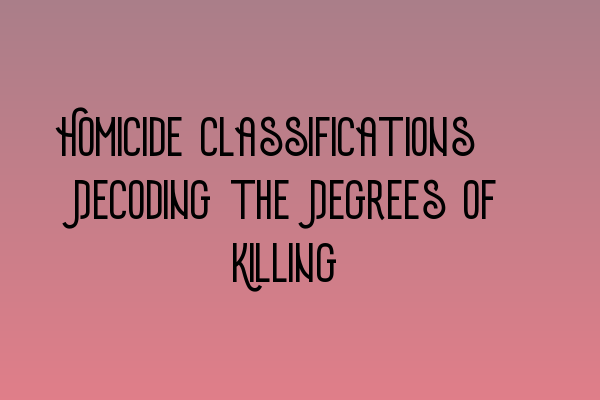Homicide Classifications: Decoding the Degrees of Killing
Welcome to the SQE Criminal Law & Practice Law UK blog! In this article, we will delve into the intriguing world of homicide classifications, aiming to decode the various degrees of killing. Understanding these classifications is crucial for both aspiring criminal law professionals and individuals seeking knowledge about the intricacies of criminal law.
Before we begin, it is important to note that the information provided here is for educational purposes only and should not be considered as legal advice. If you require legal assistance or representation, please consult with a qualified solicitor.
Homicide, in its simplest form, refers to the act of one person causing the death of another. However, the law recognizes that not all instances of killing are the same. Different circumstances and intentions can lead to various degrees of culpability.
Let’s explore the three main classifications of homicide:
1. Murder
Murder is the most serious degree of killing, involving the intentional and unlawful act of causing another person’s death. It is crucial to establish the intention to kill or cause grievous bodily harm in order to establish a charge of murder. The legal distinction between murder and other forms of killing lies in the presence of malice aforethought.
To further understand the complexities of murder charges, consider reading our related article on Decoding Criminal Evidence Rules: A Detailed Analysis.
2. Manslaughter
Manslaughter, on the other hand, encompasses situations where the act of killing may not be intentional or premeditated. It involves unlawfully causing another person’s death without the presence of malice aforethought. Manslaughter charges can be classified into two main categories: voluntary manslaughter and involuntary manslaughter.
For more in-depth information about manslaughter charges, we recommend exploring our related article on Updates in UK Criminal Laws: Staying Informed and Prepared.
3. Infanticide
Infanticide refers specifically to the killing of an infant within the first year of its life by the child’s mother, who is generally suffering from a mental disorder caused by childbirth. This classification recognizes the unique circumstances surrounding postpartum mental health issues and provides a separate legal framework to address them.
Intrigued by the intricate dynamics of criminal law? Consider attending our Workshops and Seminars on Criminal Practice: Expanding Your Expertise to enhance your understanding of various legal nuances.
It is important to remain well-informed and continuously update your knowledge in the field of criminal law. By joining our SQE Criminal Law Study Group, you can engage in meaningful discussions and exchange ideas with fellow legal enthusiasts.
Remember, knowledge is power, especially when it comes to understanding the intricacies of criminal law. Stay informed, stay prepared!
If you have any further questions or need legal assistance, please do not hesitate to contact us at SQE Criminal Law & Practice Law UK.
